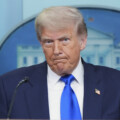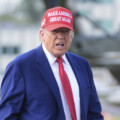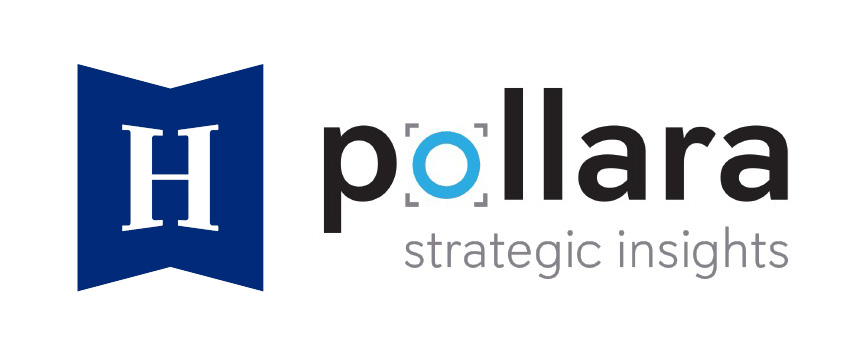
In the lead-up to the November 2024 U.S. presidential election, The Hub and Pollara are teaming up to provide insights into what Canadians make of the race as it unfolds. Pollara senior advisor Andre Turcotte will provide exclusive polling and analysis to Hub readers, helping them understand how fellow Canadians are making sense of the election and its implications for Canada.
Is democracy really under siege? There seem to be signs everywhere that it is, with the most attention given to the run-up to another unprecedented presidential election in the U.S. While a potential repeat of January 6 looms large in Washington should former president Donald Trump come up short, there are several other worrisome signals.
Several American commentators expect misinformation and disinformation campaigns by foreign actors like Russia, China, and Iran to intensify in the coming months. Others are worried about the use of artificial intelligence to create sophisticated false narratives online. Many were perplexed by the U.S. Supreme Court’s decision to grant immunity from prosecution to the president and the power that ruling would give future world leaders. There are even more troubling talks of retribution and televised military tribunals after the 2024 election.
While the Canadian experience is more subdued, we also have our own concerning threats. Over the last few years, rumours about foreign meddling and electoral interference have been swirling in Ottawa. Most dealt with vague allegations about disinformation campaigns aimed at undermining trust in our democratic institutions. More tangible claims have been made recently, with some likely involving members of Parliament. This has led to the appointment of Quebec judge Marie-Josée Hogue, who is now tasked with examining allegations of foreign interference by China, Russia, and other foreign states in the 2019 and 2021 federal elections.
In Pollara’s latest polling—conducted between June 6 and 17, 2024, with 1,750 adult Canadians—we examined Canadians’ views on the general health of our democracy, our electoral process, the reliability of news, and what is going on south of the border.

Graphic credit: Janice Nelson.
Canadians give a tepid but positive assessment of the current state of democracy in their country under Prime Minister Trudeau. In total, 40 percent are satisfied with democracy in this country. However, only 7 percent are “very satisfied,” and a further one-third ( 33 percent) are “somewhat satisfied.” One-quarter (around 25 percent) hold a neutral view on this question. More than one-third of Canadians (35 percent) are dissatisfied, including a significant 15 percent who are “very dissatisfied.” Albertans (53 percent are dissatisfied), Conservative supporters (53 percent), and Canadians between the ages of 35 and 49 (43 percent) are those most likely to hold a negative view of the state of Canadian democracy.
Trump and the weakening of democracy
Whatever reservations Canadians may have about the state of our democracy, it pales in comparison to the impression they have of the situation in the United States. Only 13 percent of Canadians are satisfied with the current state of democracy down south. Among them, only 3 percent are “very satisfied.” In contrast, 43 percent are either somewhat (21 percent) or very dissatisfied (22 percent), with a whopping 44 percent taking a neutral stance. Dissatisfaction around American democracy is shared among people of all ages and across the country, with older Canadians (52 percent) and British Columbians (51 percent) expressing the highest level of displeasure.
A key element linked to the health of a democracy is the confidence in the integrity of the electoral process. Here again, we find a wide gap between how Canadians feel about their own election process and how they see their American counterparts. More than half of Canadians (54 percent) have confidence in the integrity of the Canadian electoral process, compared to 24 percent who hold the opposite view. The remainder—22 percent—hold a neutral position on the issue. When asked about their perception of the integrity of the electoral process in the United States, only 25 percent of Canadians have confidence in the U.S. electoral process compared to 43 percent who lack confidence. Not surprisingly but nevertheless meaningful, the former U.S. president bears the brunt of the blame for the erosion of confidence. In our latest analysis, 57 percent of Canadians believe Trump has weakened democracy.
We have seen in our previous studies that Canadians are cringing at the possibility of a second Trump presidency. Since January, Pollara Strategic Insights has been monitoring Canadians’ interests and attitudes toward the upcoming U.S. election. From the beginning, we found that about 60 percent of Canadians are paying some attention to the contest. Only about 20 percent would like to see Trump re-elected.
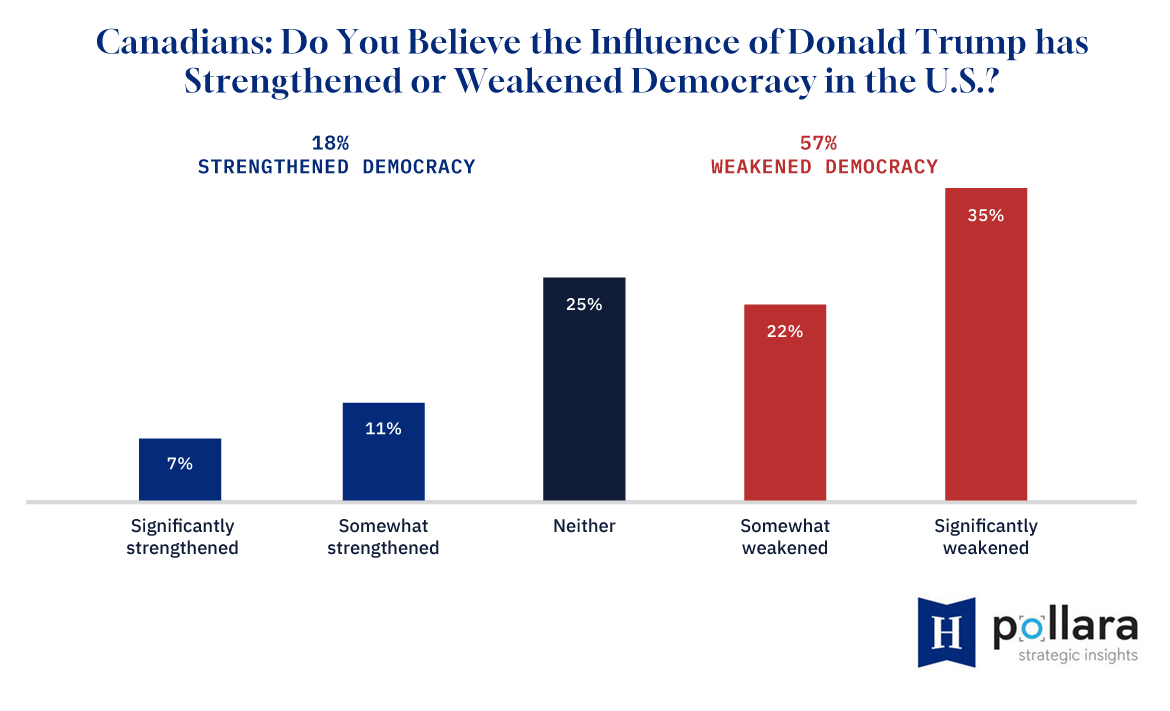
Graphic credit: Janice Nelson.
Who will tell the people?
In his 1992 book Who Will Tell the People, the late journalist and social critic William Greider suggested that “the decayed condition of American democracy is difficult to grasp, not because the facts are secrets, but because the facts are visible everywhere.”
While written more than 30 years ago, this observation rings even more true today. Everyone is watching one of the world’s oldest modern democracies being assailed by a number of forces, which leaves us largely puzzled. However, Canadians understand the stakes. There is a pronounced dissatisfaction among Canadians regarding the state of democracy in the U.S. The level of confidence in the integrity of the U.S. election process is low among Canadians, contrasted with a generally higher confidence in our own electoral system. Moreover, most Canadians (nearly 60 percent) believe Trump has weakened democracy in the U.S., with this belief being particularly strong among supporters of the Liberal, NDP, and Bloc parties. Maybe more consequential is the fact that Canadians are keenly aware of the influence of the U.S. political climate on their own country’s political stability. Almost half of Canadians (48 percent) believe the political climate in the U.S. has a major impact on Canadian political stability.
The question of what can be done remains. Or more specifically, who can be trusted to shed light on the situation. Once again, Greider may have been prescient in exposing the increasingly limited resources we have to correct the situation. Greider suggested that the self-correcting mechanisms of politics, especially media scrutiny and accountability, are no longer working.
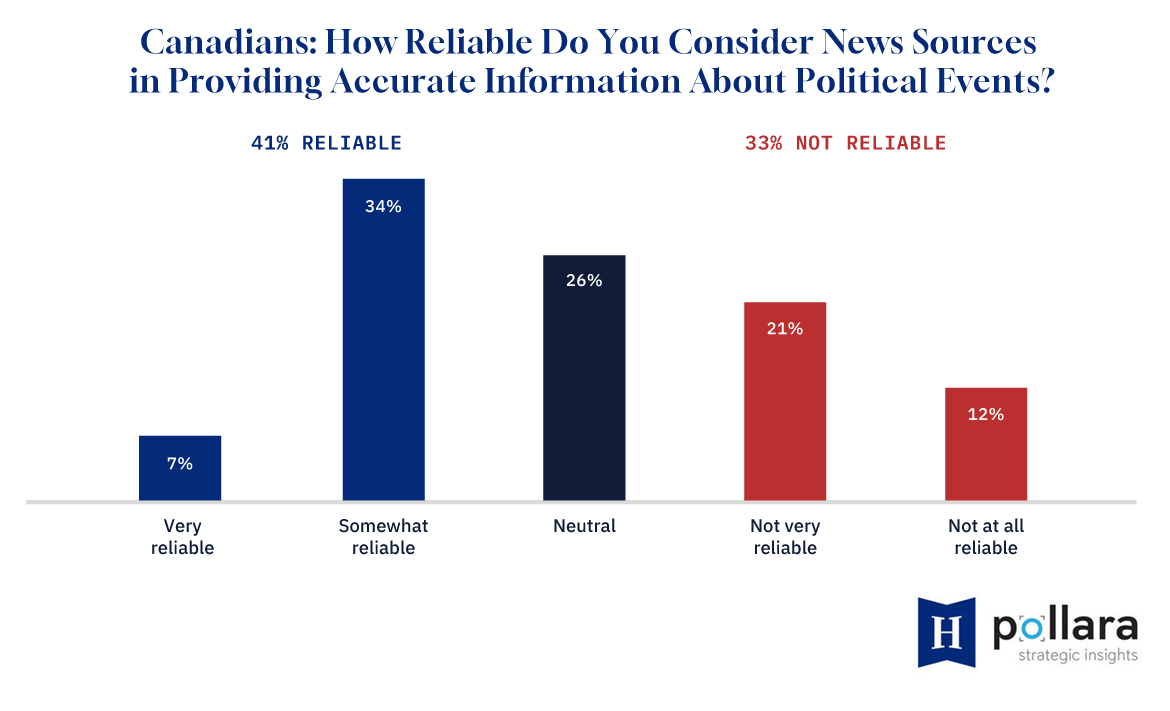
Graphic credit: Janice Nelson.
Canadians unknowingly agree with Greider. Add to this only 7 percent of Canadians feel the news media is reliable in providing accurate information about political events. Let’s reflect on this again—only 7 percent of Canadians feel the news media is reliable in providing accurate information about political events. With such distrust, we may indeed ask, “Who will tell the people their democracy is eroding?” And more importantly, “Will we believe them?”



